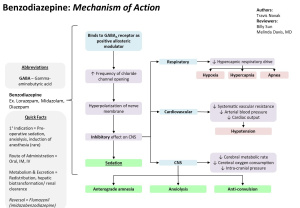
What are Anxiolytic Drugs?
Anxiolytics are drugs that act to reduce anxiety. Benzodiazepines are the strongest anxiolytic drugs used commercially but SSRIs and SNRIs, weaker anxiety-reducing drugs, are often prescribed to individuals with both anxiety and depression diagnoses. Benzodiazepines cause strong, immediate anxiety relief and SSRIs/SNRIs are prescribed for long term use and relieve anxiety to a lesser degree
An Overview of Benzodiazepines
Benzodiazepines are very strong anxiolytic drugs with their effects felt immediately. They are commonly not prescribed for more than 1 month at a time unless in more severe situations. These drugs include lorazepam, alprazolam, clonazepam, diazepam, and chlordiazepoxide (marketed as Xanax, Klonopin, Librium, Valium, and Ativan). The side effects of these drugs are dramatic, including memory impairments, sedative effects, impaired judgment, and a higher risk of experiencing depression and suicidal thoughts. These drugs all act in the same way, biochemically and kinetically, but they differ in terms of their potency. Benzodiazepines act by binding to the GABA receptor as allosteric modulators, making it easier for chloride ions to flow into the cell, hyperpolarizing the nerve membrane which leads to widespread inhibitory effects throughout the central nervous system and sedation, including anxiolysis, short term anterograde amnesia, and anti-convulsion (Fig. 1). A common symptom of anxiety is faster breathing and heartbeat, but benzodiazepines reduce these symptoms by decreasing the frequency of certain cardiovascular and respiratory functions (1).

Figure 1: Mechanism of Action of Benzodiazepines
Serotonin and Norepinephrine Reuptake Inhibitors
While benzodiazepines are the strongest drugs designed to treat anxiety, SSRIs and SNRIs have also been found to be effective, particularly in patients with anxiety and depression. These drugs include citalopram, escitalopram, fluoxetine, and sertraline (marketed as Celexa, Lexapro, Prozac, and Zoloft). These substances are weaker than benzodiazepines because they exert their effects on serotonergic synapses, which has a weaker impact on anxiety. These drugs were designed primarily to treat depression but increasing serotonin levels in the synapse can reduce perceived feelings of anxiety. SSRIs bind to the reuptake channel on the presynaptic cell, preventing the released serotonin from being deactivated. Some of the serotonin will bind to the receptor on the postsynaptic cell but once all binding sites are occupied, the remaining molecules will be held in the synapse (2). Normally, these would be taken back to the presynaptic cell but since the SSRI is blocking the channel, the serotonin will stay activated. SSRIs are designed for long-term use. Over time, they modulate the density of serotonin receptors on the postsynaptic cell so it can take weeks before the patient can detect any significant changes. SSRIs are also very different from each other. They differ in their potency, pharmacokinetics, half-life, and binding affinity to the reuptake channel, so it can be difficult to prescribe the most optimal drug. Side effects of these substances include agitation, appetite problems, dizziness, headache, nausea, insomnia, and reduced libido (2). SNRIs involve the same mechanism and relatively the same side effects, but the effects are exerted on noradrenergic neurons by blocking norepinephrine reuptake.

Figure 2: Mechanism of SSRI’s
Conclusion
Anxiety drugs are very diverse and it can be difficult to know which drug is the best for which person. Benzodiazepines are the strongest, but typically can’t be used for more than a few weeks and have strong side effects by acting on the GABA receptors. SSRIs are weaker than benzodiazepines but still have noticeable effects, but their mechanism involved modulation of the postsynaptic cell, which can take weeks, making them more difficult to prescribe and treat a struggling individual.
Sources:
- https://calgaryguide.ucalgary.ca/benzodiazepine/
- https://www.registerednursern.com/ssris-antidepressants-nclex-questions/
- https://www.frontiersin.org/articles/10.3389/fpsyt.2014.00005/full